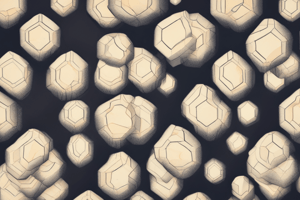Podcast
Questions and Answers
What makes carbon unique in the realm of organic chemistry?
What makes carbon unique in the realm of organic chemistry?
- Its ability to form covalent bonds only with carbon atoms.
- Its tetravalent nature and capability to form covalent bonds with other elements. (correct)
- Its unreactive nature towards other elements.
- Its tendency to form ionic bonds exclusively.
What type of hydrocarbons consist of only carbon and hydrogen atoms?
What type of hydrocarbons consist of only carbon and hydrogen atoms?
- Alkanes (correct)
- Ketones
- Aldehydes
- Alcohols
Why are alkenes considered unsaturated hydrocarbons?
Why are alkenes considered unsaturated hydrocarbons?
- Because they contain only single bonds between carbon atoms.
- As they have the maximum number of hydrogen atoms possible.
- Due to their linear structure.
- For having one or more double bonds between carbon atoms. (correct)
What contributes to the diverse range of molecules that carbon can form in organic chemistry?
What contributes to the diverse range of molecules that carbon can form in organic chemistry?
In organic chemistry, what is the term for saturated hydrocarbons?
In organic chemistry, what is the term for saturated hydrocarbons?
Why are hydrocarbons considered the simplest organic compounds?
Why are hydrocarbons considered the simplest organic compounds?
What is the role of functional groups in organic molecules?
What is the role of functional groups in organic molecules?
What aspect of organic chemistry deals with the three-dimensional arrangement of atoms in molecules?
What aspect of organic chemistry deals with the three-dimensional arrangement of atoms in molecules?
What is a common characteristic of chiral compounds?
What is a common characteristic of chiral compounds?
In organic chemistry, what is the purpose of synthetic organic chemistry?
In organic chemistry, what is the purpose of synthetic organic chemistry?
Which field applies organic chemistry principles to the design, discovery, and development of new drugs?
Which field applies organic chemistry principles to the design, discovery, and development of new drugs?
What are some future challenges and opportunities in organic chemistry mentioned in the text?
What are some future challenges and opportunities in organic chemistry mentioned in the text?
Flashcards are hidden until you start studying
Study Notes
Uncovering Organic Chemistry's Fascinating World
Organic chemistry is a branch of chemistry that focuses on the study of carbon-containing molecules, which are the building blocks of living organisms. This dynamic field is vast and intertwined with our understanding of life, and it continues to captivate chemists worldwide with its intricate structures and transformations. Let's explore the intriguing world of organic chemistry, where molecules become the stars of the show.
The Basics: Carbon's Bonding and Reactivity
Organic chemistry revolves around carbon, the most versatile element in the periodic table. Carbon is unique because it can form covalent bonds with other carbon atoms and various other elements, creating a diverse range of molecules.
Carbon's bonding and reactivity can be attributed to its tetravalent nature and its ability to form covalent bonds with other elements through its four valence electrons. Carbon's multiple bonding preferences lead to various types of bonds, including single, double, and triple bonds, as well as resonance structures.
The Structures: Hydrocarbons and Functional Groups
Hydrocarbons are the simplest organic compounds, consisting of only carbon and hydrogen atoms. Their structures can range from linear chains to branched and cyclic arrangements. Alkanes (saturated hydrocarbons) and alkenes (unsaturated hydrocarbons) are two primary classes of hydrocarbons.
Functional groups are specific arrangements of atoms within a molecule that impart unique reactivity and properties. Aromatic compounds, such as benzene, are another class of organic molecules with distinctive structures and reactivity patterns. Functional groups and the specific structures they form serve as the foundation for the vast array of organic compounds.
The Reactions: Mechanisms and Stereochemistry
Organic reactions are a crucial aspect of the field, providing insights into molecular transformations and the formation of new compounds. Reaction mechanisms often involve the breaking and formation of covalent bonds, as well as the transfer of electrons, resulting in the formation of new molecules.
Stereochemistry is a vital aspect of organic chemistry, as it deals with the three-dimensional arrangement of atoms in molecules and its effect on optical activity and other properties. Chiral compounds have non-superimposable mirror images, and their enantiomers can exhibit different physiological effects.
The Applications: Synthetic and Medicinal Chemistry
Organic chemistry is central to the development of new drugs, materials, and technologies. Synthetic organic chemistry involves the creation of new compounds by designing and carrying out specific reactions. Many important drugs, such as aspirin, penicillin, and morphine, have their origins in organic chemistry.
Medicinal chemistry is the application of organic chemistry to the design, discovery, and development of new drugs. Medicinal chemists use their knowledge of organic chemistry to develop therapeutic agents with improved efficacy, safety, and pharmacokinetic properties.
The Future: Challenges and Opportunities
The exploration of organic chemistry continues to expand our understanding of life and offers numerous opportunities for the advancement of science, medicine, and technology. Some of the future challenges and opportunities include:
- Developing more efficient and environmentally friendly synthetic methods.
- Exploring the potential of bio-inspired chemistry to create new materials and drugs.
- Investigating the relationship between molecular structure and biological activity.
- Utilizing artificial intelligence and machine learning to predict and design new molecules.
Organic chemistry is an exciting and dynamic field that continues to evolve and inspire chemists around the world. Its applications are far-reaching, and its impact on our daily lives is profound. So, the next time you take a medication or use a modern material, consider the fascinating world of organic chemistry that made it all possible.
Studying That Suits You
Use AI to generate personalized quizzes and flashcards to suit your learning preferences.




